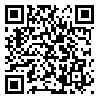Volume 5, Issue 2 (June 2023)
IEEPJ 2023, 5(2): 14-24 |
Back to browse issues page
Download citation:
BibTeX | RIS | EndNote | Medlars | ProCite | Reference Manager | RefWorks
Send citation to:



BibTeX | RIS | EndNote | Medlars | ProCite | Reference Manager | RefWorks
Send citation to:
Bakrani Balani Z, keshtiaray N, Azizi Malekabadi H. (2023). Science Education in the Second Grade of Elementary School: A Research Synthesis. IEEPJ. 5(2), 14-24. doi:10.61186/ieepj.5.2.14
URL: http://ieepj.hormozgan.ac.ir/article-1-536-en.html
URL: http://ieepj.hormozgan.ac.ir/article-1-536-en.html
1- PhD Student, Department of Curriculum planning, Isfahan (Khorasgan) Branch, Islamic Azad University, Isfahan, Iran
2- Associate Professor, Department of Educational Science, Isfahan (Khorasgan) Branch, Islamic Azad University, Isfahan, Iran ,keshtiaray@gmail.com
3- Assistant Professor, Department of Physiology, Basic Dental Sciences, Islamic Azad University, Isfahan (Khorasgan) Branch, Isfahan, Iran
2- Associate Professor, Department of Educational Science, Isfahan (Khorasgan) Branch, Islamic Azad University, Isfahan, Iran ,
3- Assistant Professor, Department of Physiology, Basic Dental Sciences, Islamic Azad University, Isfahan (Khorasgan) Branch, Isfahan, Iran
Abstract: (2434 Views)
The current research is qualitative research that was conducted using the synthesis research method based on the deductive model. The research environment in the synthesis phase included all citations in the range of 2008 to 2020 for the studies conducted in the field of experimental science education of the second grade in elementary school. Based on this, 40 sources were selected by purposive selection method. Stopping the sampling process was based on information saturation. Data collection was done using a survey in the research environment and based on the synthesis of experimental science education in the second grade of primary school. According to the findings of the research synthesis based on the deductive model, the environmental factors affecting experimental science education in the second grade of primary school include: support factors (family-oriented, school-oriented), extracurricular environment, socio-cultural environment, science curriculum design including goals (instructional, educational, motivational), content (knowledge, practical skills, challenging thinking), teaching strategies (group discussion, advance organizer, exploration, problem solving, learning assistants, laboratory, cognitive development, game-oriented, aesthetic), intra-school environment (independent, individual, deep, collaborative, exploratory), evaluation (evaluation tools, evaluation methods), learned skills (life skills, mental skills, social skills, thinking skills), science education approaches (teacher-centered, student-centered) and learning experiences (meaningful experiences and valuable experiences). The findings provide useful implications for science education in elementary school and can be used by elementary school teachers and parents for science education as well.
Type of Study: Original |
Subject:
Educational Psychology
Received: 2022/03/2 | Accepted: 2022/06/15 | Published: 2023/06/1
Received: 2022/03/2 | Accepted: 2022/06/15 | Published: 2023/06/1
References
1. Abdolmaleki, S., Khosravi, M., Ghaderi, M., & Maleki, H. (2021). The comparison of guided Play, free Play and Direct instruction effects in children's learning of first grade science. Research in Curriculum Planning, 17(67), 167-182. [DOI:10.30486/jsre.2021.1898106.1627]
2. Abolghasemi, M., & Mohamadi, H. (2020). The effectiveness of filliped learning method on attitude and academic performance in Mathematics in elementary schools. Technology of Education Journal (TEJ), 15(1), 1-8. [DOI:10.22061/jte.2019.5169.2183]
3. Ahmadabadi, A., zeinabadi, h. r., & Ostadrahimi, M. (2021). The effect of flipped teaching methods in comparison with cooperative, inquiry and speech methods on learning experimental sciences for sixth grade elementary students. Research in Teacher Education(RTE), 4(1), -. https://te-research.cfu.ac.ir/article_1471_953e367e5e405d2f16ce4e9a14dda13b.pdf
4. Amani Saribaglou, J., Vahedi, S., Fathi azar, E., & Abidi, L. (2019). The effect of reversed jigsaw classroom on university students' academic performance and statistics anxiety. Educational Psychology, 15(52), 133-153. [DOI:10.22054/jep.2019.30599.2183]
5. Bergmann, J., & Sams, A. (2012). Flip your classroom: Reach every student in every class every day. International society for technology in education.
6. Brahuei Moghadam, N. M., & Kahrazehi, M. (2020). A Comparative Study of Teaching Methods Used for Teaching Science in the Elementary Schools in Iran and the United Kingdom. Teacher Professional Development, 5(2), 41-58. https://tpdevelopment.cfu.ac.ir/article_1416_b8b6e8ba78f531fd97aea8c5ae7bba74.pdf
7. Forootan, K., Hashemi, S. A., Qaltash, A., & Mashinchi, A. A. (2023). The effect of using the reverse class approach on learning the experimental sciences of elementary school students [Research]. Journal of Psychological Science, 21(119), 2285-2302.
https://doi.org/10.52547/JPS.21.119.2285 [DOI:10.52547/jps.21.119.2285]
8. Harlen, W. (2005). Teaching, learning and assessing science 5-12. Sage.
9. Hug, B., Krajcik, J. S., & Marx, R. W. (2005). Using innovative learning technologies to promote learning and engagement in an urban science classroom. Urban Education, 40(4), 446-472. [DOI:10.1177/0042085905276409]
10. Kenna, D. C. (2014). A study of the effect the flipped classroom model on student self-efficacy North Dakota State University].
11. Mirdrikvandi, F. (2016). The effect of active teaching method on academic performance in science: the case of 3rd grade junior high school students in Andimeshk city (2010-2011). Research in Curriculum Planning, 12(47), 133-144. https://jsr-e.isfahan.iau.ir/article_534406_2a18b79383144b02baf17b1ea0263dc7.pdf
12. Momeni Mehmoi, H., Karsheki, H., Azizi Fard, T., & Ajam, A. A. (2013). The role of teachers' awareness of new teaching methods and career motivation on students' academic progress The first national conference on sustainable development in educational sciences and psychology, studies Social and Cultural,, Tehran. https://civilica.com/doc/320404
13. Perignat, E., & Katz-Buonincontro, J. (2019). STEAM in practice and research: An integrative literature review. Thinking skills and creativity, 31, 31-43. [DOI:10.1016/j.tsc.2018.10.002]
14. Stinner, A., Mcmillan, B. A., Metz, D., Jilek, J. M., & Klassen, S. (2003). The renewal of case studies in science education. Science & Education, 12, 617-643.
https://doi.org/10.1023/A:1023091932201 [DOI:10.1023/A:1025648616350]
15. Strand-Cary, M., & Klahr, D. (2008). Developing elementary science skills: Instructional effectiveness and path independence. Cognitive Development, 23(4), 488-511. [DOI:10.1016/j.cogdev.2008.09.005]
16. Zimmerman, B. J. (2000). Attaining self-regulation: A social cognitive perspective. In Handbook of self-regulation (pp. 13-39). Elsevier. [DOI:10.1016/B978-012109890-2/50031-7]
Send email to the article author
| Rights and permissions | |
 |
This work is licensed under a Creative Commons Attribution-NonCommercial 4.0 International License. |









